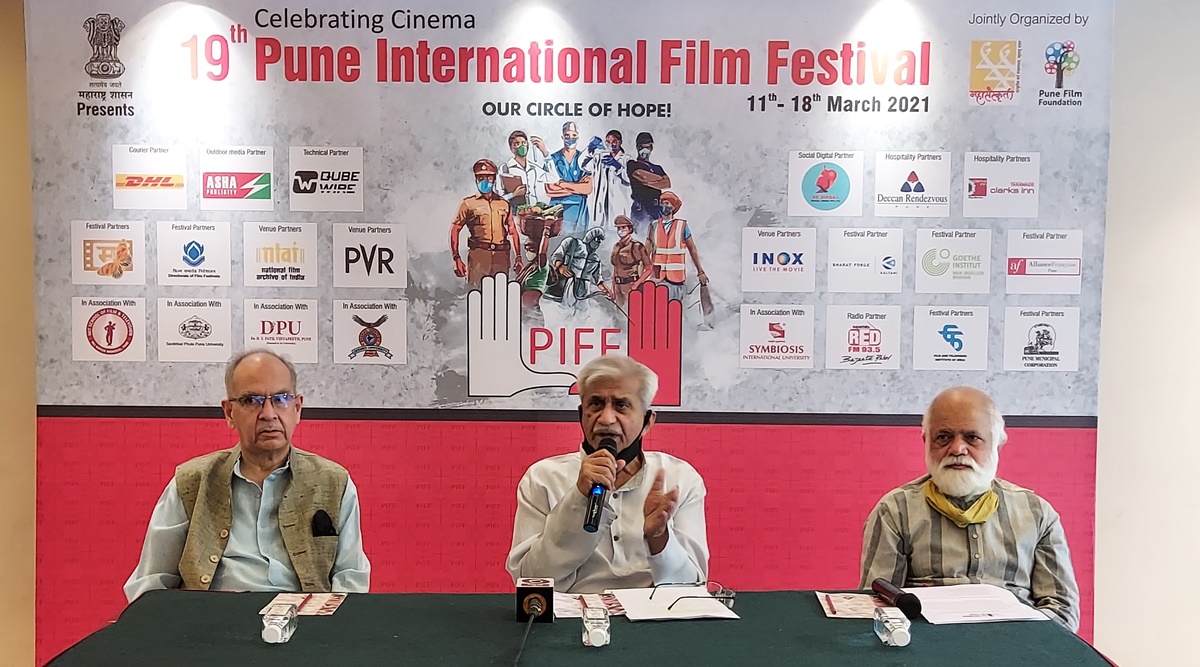 The Pune Film Foundation in association with the Maharashtra government shortlisted 14 films from 10 countries, including one from India, which will compete under the ‘World Competition Section’. (Express Photo by Ashish Kale)
The Pune Film Foundation in association with the Maharashtra government shortlisted 14 films from 10 countries, including one from India, which will compete under the ‘World Competition Section’. (Express Photo by Ashish Kale) Set in the remote Mongolian mountains, The Woman, by director Otgonzorig Bathchuluun, is about Dagiina who lives with Eruult, her mother-in-law and her two young children, Ider and Ujin. From time-to-time, a local man comes and helps her with difficult tasks and always asks her to move to the nearest town with him. Dagiina’s hands are tied to the place, since her mother-in-law wouldn’t be able to get accustomed to the town lifestyle. The film, which is the opening film of the 19th edition of the Pune International Film Festival (PIFF), will see some things change as the plot progresses while some remain painfully the same.
The festival, which will be held from March 11 to 18, received 1,600 entries from 64 countries, from which 153 films were shortlisted while 26 films will be showcased online.
The Pune Film Foundation in association with the Maharashtra government shortlisted 14 films from 10 countries, including one from India, which will compete under the ‘World Competition Section’.
Dr. Jabbar Patel, festival director, PIFF, announced the names of the eight jury members, which includes Hungarian film critic Gyorgy Baron, Iranian filmmaker Mania Akbari, actor Lisa Ray, Luong Dinh Dung, writer and filmmaker from Vietnam, Andrej Kosak, filmmaker from Slovenia, Serbian writer and filmmaker Goran Radovanovic, Sreekar Prasad, editor and filmmaker Suman Mukhopadhyay from India. “For both the world cinema as well as the Marathi cinema competition, we have decided that the jury will judge the competition online,” he said.
Some of the films competing under the ‘World Competition Section’ are In the Shadows by Erdem Tepegoz (Turkey), The Alien directed by Nader Saeivar (Iran), True Mothers by Naomi Kawase (Japan), Russian Death by Vladimir Mirzoev and Dear Comrades by Andrei Konchalovsky from Russia. 12*12 directed by Gaurav Madan is the Indian entry in the World Cinema category.
Additionally, Samar Nakhate, creative director, PIFF, also announced the names of the seven films in the Marathi competition as well as the five Marathi films (Non-Competition Category) during a press conference on Thursday. The names of these films are: Poraga Majetay directed by Makarand Mane, Firastya directed by Vitthal Machindra Bhosale, FUN’ERAL directed by Vivek Dubey, June directed by Vaibhav Khisti and Suhrud Godbole, Godakaath directed by Gajendra Ahire, Kalokhachya Parambhya directed by Makarand Anaspure and Tak-Tak directed by Vishal Kudale. The non-competition Marathi films are GOTT directed by Shailendra Krishna, Taath Kana directed by Girish Mohite, Kandil directed by Mahesh Kand, MAY FLY directed by Kiran Nirmal and Jeevanacha Gondhal directed by Prashant Dattatray Pandekar.
“The non- competition Marathi competition films are ones that we thought, during our sieving process of film selection, people must watch,” said Nakhate.
Amit Tyagi, associate director, MIT School of Film and TV, said that due to the pandemic, production and the filmmaking industry took the biggest hit and this year, the annual ‘Student Film’ competition will not be held. “We have instead invited at least two films from each of the six different organisations, including Pune’s Film and Television Institute of India (FTII), MIT Film and Television School, Satyajit Ray Film and Television Institute (SRFTI), Kolkata, Whistling Woods, Mumbai, Jerusalem Film School, Israel and Inkas Film School, Brazil, which will be shown,” he said.
Vishal Shinde, deputy director programme and film unit, PIFF, said the festival will use a New Zealand-based online streaming platform called ‘Shift 72’, where viewers will be able to log in from only one device at a time.
“Movies shown each day will be available to online viewers anytime for 24 hours and a link will be sent to the registered audience on their email. The identity of the spectator will be registered, which addresses the risk of downloading or recording movies. As for offline screenings, we have seven screens where 50 per cent capacity will be allowed following all necessary guidelines. Seating will be on first come first serve basis, with due intervals between each screening,” he said.